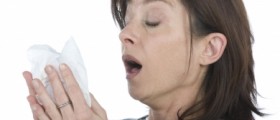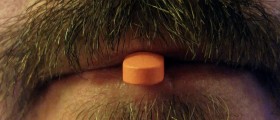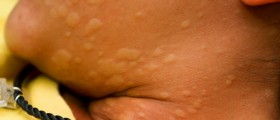What is Piriton and How Does it Work?
Piriton is a drug which is available in the form of tablets and syrup. Piriton contains the chlorphenamine maleate, whose role is to prevent the actions of histamine which can be found in the mast cells in the body. When the body reacts to an allergen, the mast cells release a great amount of histamine and allergic symptoms (such as an increase of blood circulation to the allergic area) appear. Chlorphenamine blocks the released histamine from binding to the receptors, and thus prevents the appearance of characteristic allergic symptoms.
Piriton‘s chlorphenamine is also called sedating antihistamine because this substance reaches the brain in the great amounts and has negative effect since it causes drowsiness.
Piriton is very effective in treating chickenpox, especially in children because they cannot stop scratching, while this drug eases itching.
Before the use of any drug, everyone should contact the doctor to avoid any unexpected side effects of the medicine. All the undesirable effects are not shown on all people equally, some users of this drug do not even feel negative effects. This medication is used in cases of allergic reaction such as hives, or due to some allergy to food, or due to allergic reaction to some medication, for example, medication for insect bites.
Possible Side Effects of Piriton
Undesirable effects of this medicine include drowsiness, dizziness, then arrhythmia, hepatitis, as well as difficulty while breathing and weakness in the muscles. Moreover, ringing in the ears and irritability can also appear. When a person consumes piriton, it is not unusual to have nightmares while sleeping. When using this drug the person should be very careful as it may cause sleepiness, blurred vision and faintness.
It is highly recommended that, during the period of using the drug, the patient does not drive cars or work on a dangerous machine. Children should avoid dangerous activities such as cycling or climbing a tree. It is advisable not to drink alcohol while using piriton for treatment of the conditions above mentioned.
- Avoid drinking alcohol while you're taking chlorphenamine. Alcohol increases the risks of side effects.
- It normally takes 30 minutes to an hour to work.
- Common side effects include feeling sick (nausea), sleepy or dizzy. You may also have difficulty concentrating, a dry mouth, headaches or blurred vision.
- Chlorphenamine is also known by the brands Allercalm, Allerief, Hayleve and Piriton.
- When mixed with other medicines, it can be called Cofsed Linctus, Galpseud Plus Linctus and Haymine.
- Children and people aged over 65 have more chance of getting some side effects, such as feeling restless, excited or confused.
- Tell your doctor straight away if you have: (1) yellowing of the skin or whites of the eyes - these can be signs of liver problems; (2) bruising or bleeding that's more than normal.
- In rare cases, it's possible to have a serious allergic (anaphylaxis) reaction to chlorphenamine.
In addition, difficulty in concentrating, urinary retention, dry mouth, as well as headache, loss of appetite and heart palpitations are also some side effects of piriton. If a person has to go through the test for some allergic reactions to skin, it is necessary to stop using piriton for at least 48 hours before testing, because tests would not be reliable due to the antihistamines which can prevent or reduce skin reaction that indicates allergy.
It is advisable, if the person notices some of these negative effects while using piriton as a medication, to visit the doctor, especially if these side effects last longer than it is normal.
















-Does-It-Help-Treat-Allergic-Rhinitis_f_280x120.jpg)

Your thoughts on this
Loading...